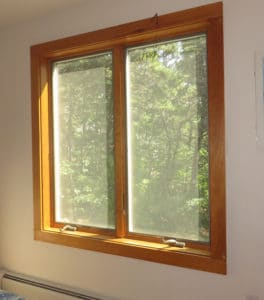Q: We are building a new home – a contemporary Cape – and are trying to decide between casement and double-hung windows. We like the look of casements, but have heard that they can be trouble. We are also trying to decide between vinyl-clad and solid-vinyl windows. Any suggestions would be appreciated. – Tom C.

A: There are definitely pros and cons to each type of window. Here are issues to consider:
Pros of Casements
Very airtight, maximum amount of uninterrupted glass (good for views and solar gain), and maximum amount of ventilation, since the entire sash opens, not just half. In addition, the open window can act as a wind scoop if oriented to catch the prevailing winds. This can be very effective for cross ventilation. Clean, contemporary lines.
Cons of Casements
If the window is left open, a lot of rain will hit the top of the sash and splash into the house, even with no wind. A good roof overhang can help a lot. In very windy weather, the wind scoop can turn into a sail and get whipped around by the wind, making a racket and potentially damaging the window. The hardware can cause trouble over time, especially with large, heavy casements. The gears that open and close the window when you operate the handle can strip. The linkage that connects the locking lever to the window locks can break. I’ve seen this happen more than a few times. The opening levers are generally easy to replace, but the locking linkage requires removing the casings to get at the guts of the window. Finally, installing a conventional window air conditioner, or a portable unit with a hose, is difficult. Typically, you’ll need to fabricate an insert to adapt the opening to the air-conditioner or hose – not a simple task.
Pros of Double-Hungs
Easy to operate, reasonably tight (with modern, high-quality window), easy to install a portable air-conditioner. With an insert, can do a pretty good imitation of true divided lites, common on older traditional windows. Tend to stay fairly dry if left open in a moderate rainstorm. Many offer easy-to-clean tilt-in sash that allow easy access to exterior surfaces.
Cons of Double-Hung Windows
Half the ventilation capacity of a casement. The meeting rail obstructs views.
Over time, the sash cords and vinyl jamb liners can deteriorate and the movable sash may not stay in the raised position. The sash cords are tensioned and can be tricky to replace.
Vinyl vs. Vinyl-Clad
Solid vinyl windows have come a long way since their introduction in the 1979s. They were originally used only for replacement windows, but were gradually accepted in the new home market. There is a wide range in quality from “builder-grade” windows to premium products. The best ones are reinforced at all their stress points so maintain good dimensional stability.
The main benefit of a solid vinyl window is that there is nothing to paint and nothing to rot (except for the exterior window trim if you use wood). The main downside is the appearance. The detailing on vinyl will never match the appearance of a wood window.
A vinyl-clad window can give you the appearance and feel of a wood window with most of the benefits of a solid vinyl window. Look for a window that has the sash (the glass and frame) fully wrapped in vinyl (or aluminum) with no exposed wood. If you like the look of natural wood, put that on the interior portions of the jamb that are protected from the weather.
Another option to consider is poltruded fiberglass. Fiberglass windows are now made by a number of manufacturers including Marvin, Pella, and some smaller companies. Fiberglass has a number of advantages over vinyl. It is stronger, more dimensionally stable, and paintable (not that you want to paint it). Because of its inherent strength and stability, the profiles can be thinner and more attractive. Some high-end fiberglass windows have attractive wood components, but avoid windows where the wood is exposed to the weather (like Marvin Integrity’s Wood-Ultrex casement).
Windows account for a big chunk of your construction budget. It’s not an area where you want to skimp. Cheap builder-grade windows often operate poorly and have very low-quality screens that you will end up replacing soon. And the window hardware will not stand the test of time.
Most window retailers have a showroom where you can see and operate installed windows. Try before you buy and, if you want a low-maintenance product, make sure that all components exposed to the weather are a durable material: fiberglass, vinyl, or aluminum.
– Steve Bliss, Editor, BuildingAdvisor.com
Leave a Reply